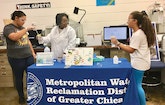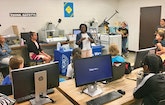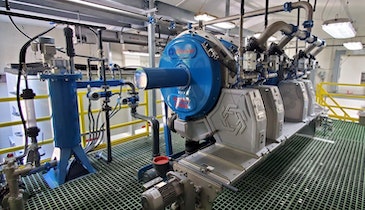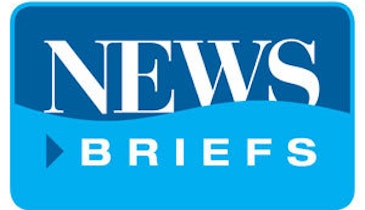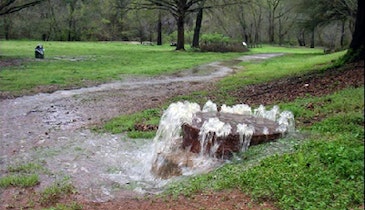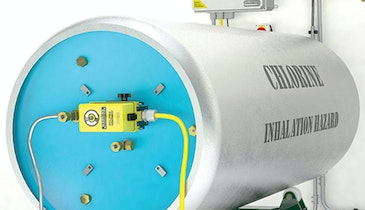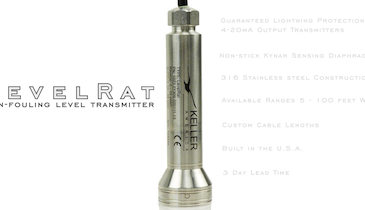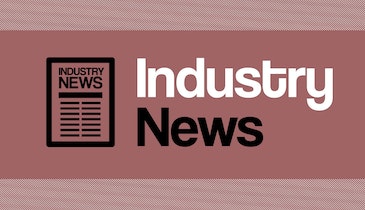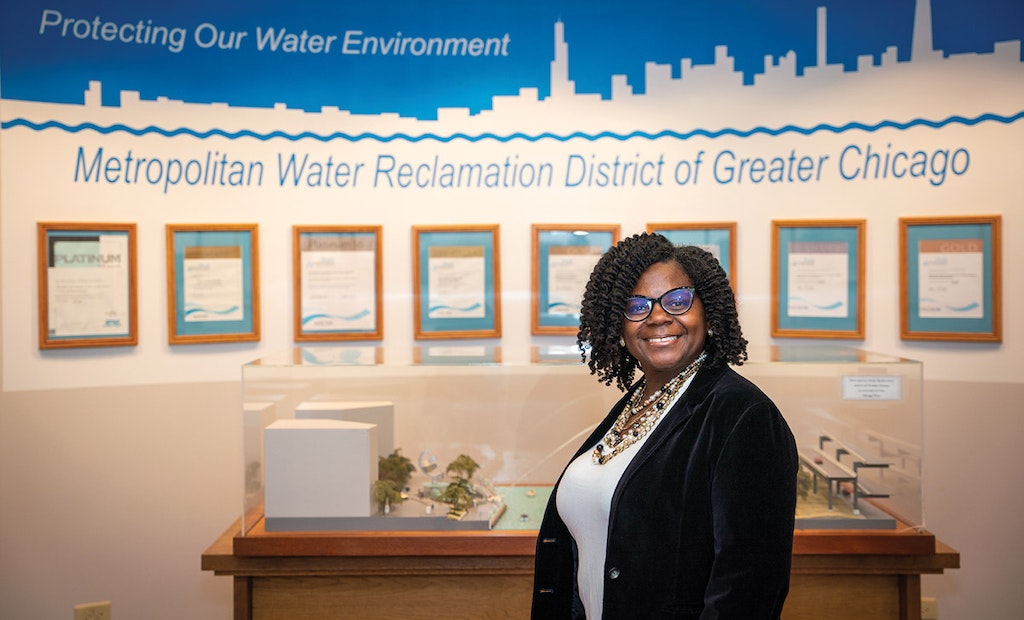
With each promotion, Tiffany Poole sets her next goal. She insists on being proficient in every role she takes on.
Interested in Laboratory?
Get Laboratory articles, news and videos right in your inbox! Sign up now.
Laboratory + Get AlertsTiffany Poole holds a personal credo of paying it forward.
“My favorite task is mentorship and empowerment of employees,” says Poole, supervising environmental chemist for the Industrial Waste Analytical Laboratories at the Metropolitan Water Reclamation District of Greater Chicago.
“I feel like when people can rest in their authority, they produce better. They’re eager, they’re outgoing. They want to do a good job when they know that what they’re bringing to the table is evaluated, is accepted, is honored. It just makes for a better work environment.”
Her current role, which she assumed in May 2020, is just the latest step in a career with unlikely beginnings and a growing sphere of influence. Poole earned a bachelor’s degree in biology from Northeastern Illinois University. After that she worked at a contract research organization on a variety of projects. Now she deals specifically with municipal and industrial entities.
CASTING THE DIE
In 2005, the contract research company was seeing massive slowdowns in orders, a harbinger of the 2008 recession. Seeing the writing on the wall, she started putting out feelers. A colleague introduced her to the public sector and asked if she would consider working at the Chicago district.
She applied and took an exam for a lab assistant position, and then had to wait. “I just kind of waded through that system, not really knowing how it would go,” she recalls. “I was used to the private sector where you apply, you interview and they let you know within a week.”
In 2008, toward the end of her third year after taking the exam, she was called up for the entry level job with the district: “I’ve been here ever since.”
As a lab assistant, Poole was responsible for sample receiving: cleaning and prepping sample bottles for field use by pollution control officers at their companies, or for treatment plant operators. She also distributed the returned sample to the appropriate lab subdivision.
LOOKING TO RISE
Ambitious from the start of her career, Poole watched and learned. “I realized how the tests flowed, how things actually worked and how different they were from private sector,” she says. “I realized then that I could jump levels.” She took exams offered in order to open doors for promotion.
Now, in her leadership position, she counsels employees to take a streamlined, intentional tack. “I encourage them to sit for the test they actually want because there is a lot of paperwork and a lot of resources used to offer these tests,” she says. “So, if you know you want to be an environmental chemist, you would sit for that test. But if they offer the laboratory technician test before they offer the EC, you can take that one, because that’s still a bump.”
Poole worked her way up the ranks through levels of lab technician and environmental chemist before stepping up to her supervisory position. She has 21 direct reports covering all the positions she previously held. The team includes:
Senior environmental chemists Anjana Patel and Paula Michels Environmental chemists Malgorzata Kokoszka, Zhenwei Zhu, Paul Poshyvanyk and Stegy Thomas Senior lab technicians Rachana Desai, Margaret Peacock and Colleen Joyce Laboratory technicians Corina Fitzpatrick, Shamir Fuller, Lashonya Phillips, Brett Heiland, Jacob Hunt, Dayana Reyes, Craig Shingles, Craig Washington, Jeremiah Campion and Matthew Witczak Lab assistants Jorge Abreu and Kina Denton
MINDFUL MAPPING
Her lab handles both municipal and industrial samples. Tests for the industrial side include cyanides and total organic carbon, BOD and COD. Her crew runs those same tests on regulatory samples of wastewater treatment plant discharges and various process stages.
The district has a separate Industrial Waste Division, where environmental specialists and pollution control technicians oversee individual users. “They collect the samples for us, and we analyze them,” Poole says.
The lab reports its analysis results to the industrial division, which then determines either that the company is compliant or provides information on how to bring their streams into compliance. “If they’re not in compliance, they would have to complete some corrective action items,” Poole says. “There will be a charge assessed if they’re discharging things that have not been cleaned to the standards of our current ordinances.”
A DAY IN THE LIFE
With four layers of employees beneath her, Poole deals more with administration than lab work. “A lot of my day-to-day is dealing with ordinances,” she says. That might mean replying to industrial users asking, for example, what reference method to use in testing for hexavalent chromium.
“I provide information for them on what we analyze for so that we kind of marry; because they have their own tests. Contract labs test for them to make sure they are in compliance before our IWD goes out to ensure they’re discharging correctly. Sometimes their contract lab is using a different method than we are; then they’re trying to compare apples to oranges.”
The lure of private sector compensation hasn’t turned Poole’s head: “I feel like there are more opportunities for growth here, and mainly stability. Once you have your civil service status, you can pretty much set your destiny.”
Each time she got a promotion, she set another goal: “And before I knew it, I was sitting at this desk. It was just like, OK, I’m here. I want to be proficient in this. I want to become an expert in this position. But what is my next step? Where do I see myself in two, three years?’”
MAKING A DIFFERENCE
In mentoring, Pools is convinced that everyone has value. “It’s not about the ‘shining star’ employee,” she says. “It may be someone who’s quiet, but I know they really love it here and are just ticking away and working in our laboratory information management system.
“So I try and nurture that, nurture what they bring to the table naturally, as opposed to just noticing the more obvious achievers. Of course, the squeaky wheel gets the oil. But sometimes there are people who aren’t so noisy, yet still have great things to offer. I try to meet everyone at their level, to encourage their strengths and work on their weaknesses.”
The secret, she says, is providing support to team members because not everyone will ask for help, even if they need it: “You have to have a bird’s-eye view of what’s happening in your lab, what your lab is made up of, and just work on those individuals. I always ask them, ‘What are your individual professional goals?’
“I had my goals when I was coming along, the ones I knew I needed to make to be within the department. Once you can marry those, you have an excellent employee and you develop that relationship. You build that morale. I always ask people how I can help get them to their next level, even if it doesn’t include my department. That means they’re going to work hard in my department as long as they’re here.”
She tries to take advantage of team members’ characteristics to point them in a direction where they’re most likely to be happy and succeed. “If I know you have your eyes set on an engineering track, that’s fine. But I can home in certain things that are going to work for you and better you, regardless of the track. You can be trained to do a task. That’s why we have standard operating procedures. But I want to show you how to be a great employee.”
COMING BACK AROUND
Poole’s effort and attitude haven’t gone unnoticed. In 2022, she received the Illinois WEA Laboratory Excellence Award. She doesn’t know who nominated her, but the effect of the recognition has been palpable.
“Even being considered, it kind of revved me up,” she says. “It got my engines going again. Sometimes you can get a little complacent, especially with what we’ve just gone through with the COVID virus. Having that award just rejuvenated me. We were in survivor mode for two years, but now it’s time to hit the ground running. It’s time to do what we love to do, which is empower people, which is efficiency and innovation.”
In 2017, Poole was invited by the district to give a talk during Women’s History Month about her career path and what her takeaway is. “For me, it’s to know your worth and never accept anything less,” she says. “Everyone has to pay dues, but you know what you’re capable of.
“You know what you bring to your table. Sometimes people make decisions based off what their family needs financially, what they need if they’re a mom or a dad. I’m not saying don’t take those into consideration.
“But sometimes you have to go out on a limb and say, ‘I value me before anything. So this is what I want.’ And if that means you have to work a little bit harder, or you have to be a little louder so they can recognize you, then that’s what you have to do.
She refers especially to the culture among millennials who, with The Great Resignation, may think about changing jobs. “There’s something to be said for that,” she says. “It’s like knowing that you’re good enough somewhere, it just may not happen to be here. And where you started isn’t necessarily indicative of where you end up.
“So you may have thought, ‘I did plan A. I’m going to do X, Y, and Z.’ But sometimes, your path takes you out of all of those positions, out of the company, out of the state. And you just have to be willing to take that leap of faith for yourself.”


